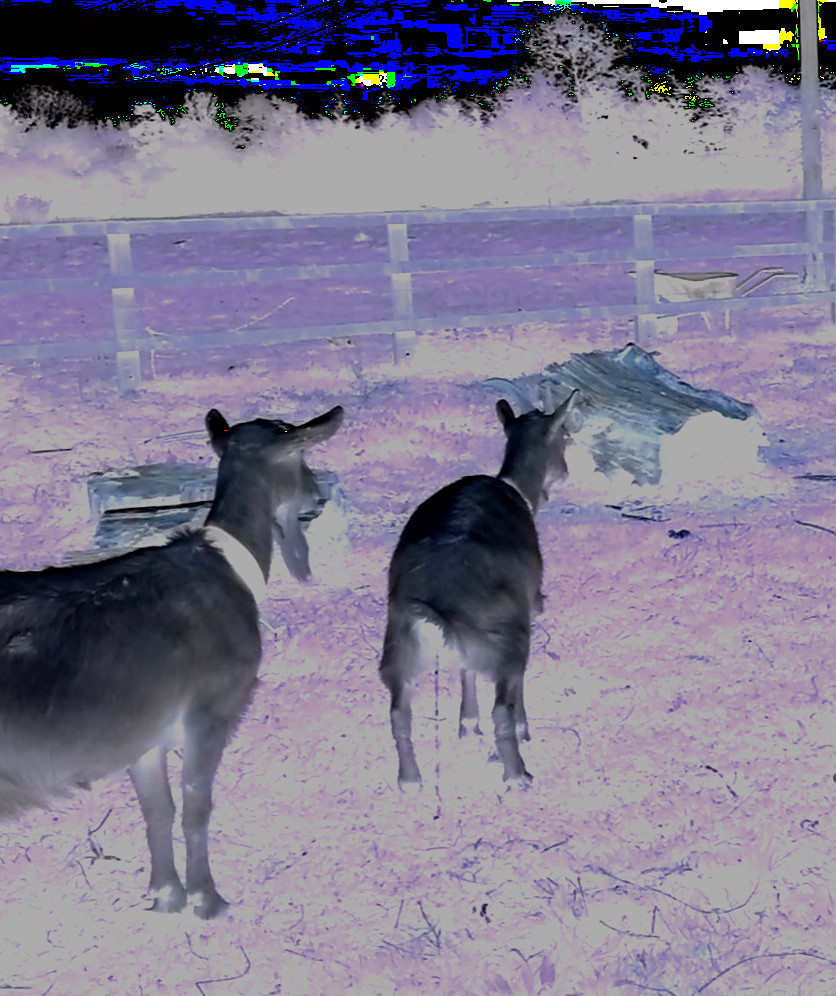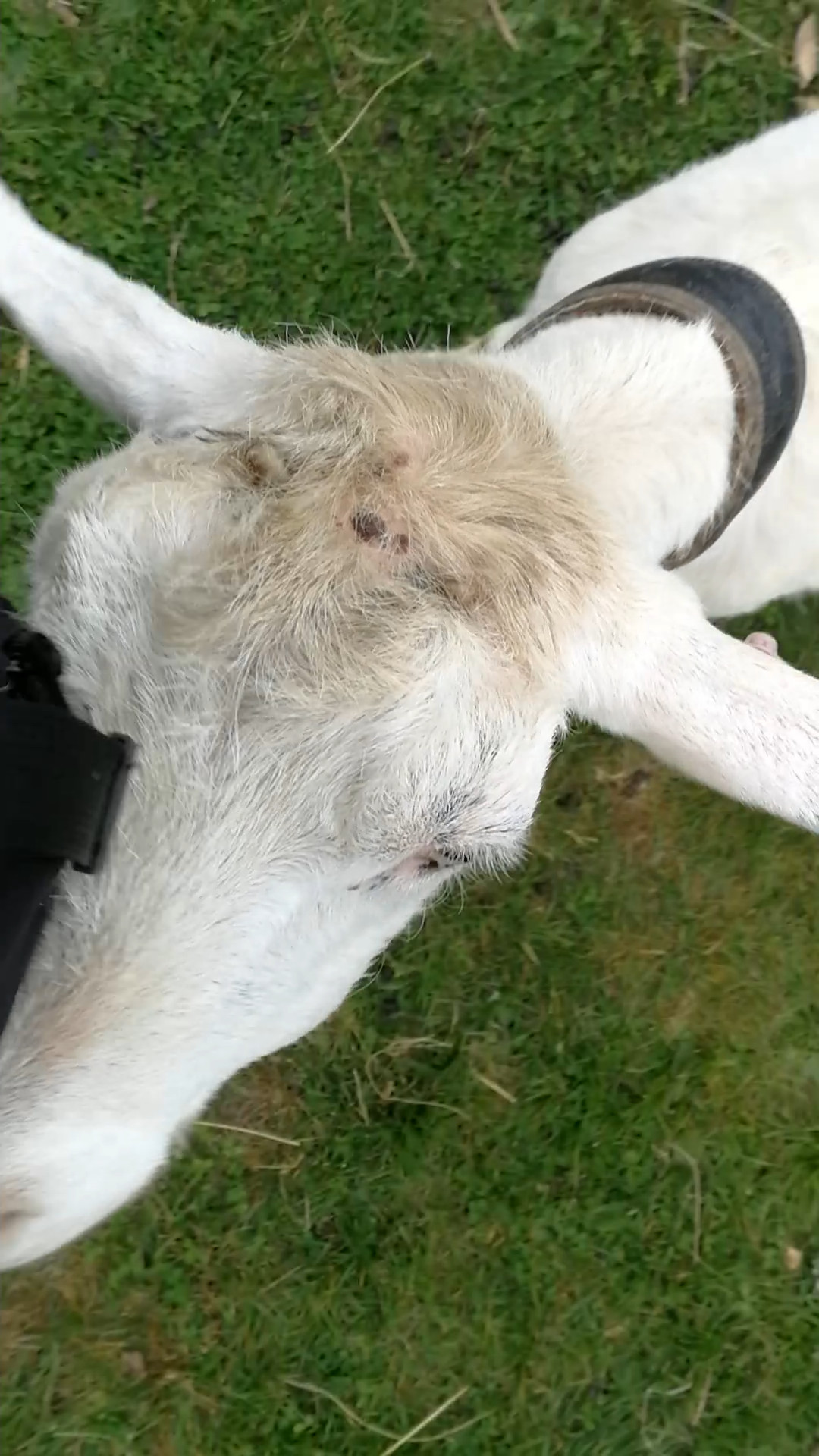
One would think that suffices to know that the farmers do not kill the kids to trust the farm. Yet human manias always find new ways to come into being.
Last may I visited this family-run farm in England to learn about cheese production. Prime concern of the farm was the respect for nature, so they let chickens roam free in the land and do not use soap that they do not ingest.
They had goats too. But the English way of keeping goats is immediate PTS trigger.
They wanted no shepherd but dogsitter. The task consisted of taking this gang of goats out of their stable on a leash, regardless of their herd instincts, to confine them within a fence not even fifty meters away. The two bucks, each one isolated from the rest, would graze on the meadow around them, as far as their leash allowed for. The females instead would all be together in the same stable, and even then, when fed on beans (beans?), would be tied up again «to prevent the stronger ones to get more beans than the others who are slower». The pleasure of rumination, always free in the mountains for the goats of any age, is apparently unthinkable in England without the counterweight of the chains hanging from the neck. We understand the country is notorious for the lack of space, lack of forests, and the goat itself has never been as common as other dairy animals. Goats too wild: they would destroy anything, especially the farmer's apple trees beyond the little enclosure. They do not listen to anyone, and just turn into a lost cause when any herd instinct is lost by the usage of the leash. For instance, goats in the wild are naturally stubborn, but once a receptive group gives heed to the shepherd's word, the recalcitrant will follow: this prodigy cannot occur when goats do not fully master their space and are taken one at a time on a leash. At this point the kids will keep on “baa'ing” (bleating) in search of their mothers but 1) they will not know how to reach them (not even twenty meters away), 2) they will not be able to prove themselves because there is a zelous God-fearing Texan boy trying to besiege them on all fronts (obviously he has to grab them and take them to the mothers, he cannot wait for them to make their own way).
Summing up, lack of space is a problem, yet there could be strategies to avoid faggotry in goat keeping, e.g. fencing the trees. Or growing plants that goats dislike to keep them at bay.
Another thing is to let them develop their own hierarchies. Perhaps a goat is voracious and wants to eat double the amount the others do, because she needs it! I saw a Greek man treating his goats to branches of his mulberry trees. He did not even care if all the goats showed up simultaneously to his call. If they came later, next time they will learn.
After all English intrusiveness was not only a matter of bean occurrences.
If at a distance the goats could only seem to be all polled, in actuality only two of them were, and all the rest of the females, included the kids, were just mutilated. Some of the horns were snapped off surgically (dehorning), some of them just thwarted from growing (disbudding) with lotions («less painful for them, they do not even notice!»). Regardless of the reason behind such a choice – protecting milk practitioners from getting hurt or pure mental glitch at the thought of horned females (the owner, after all, was a matrona and the Latin word cornuta is maintained across so many languages in the world) – nothing can justify. Not the fact that plenty of farmers do it (remember: only plebs accept things by the consideration that «others do it too»), not the fact that it is also commonly done to cows (it should not indeed; hard not to turn vegan in the cities!), not the fear of them hurting people: just select the people better.
I liked the land-owner matrona but I could not tolerate her regurgitating what I found out to be the motto of all the dehorning advocates: «In the wild goats need horns for protection, but here they do not have threats to be protected from». Again we understand: no Lucanian wolves here, no forests, not even hawks; England is domesticated at the core. Yet the quote is humbug, for the horns are not solely meant for protection, as anyone observing nature would know. Horns trace the age of the animal, the history and beauty. Headbutting is essential in goats' dynamics to gauge the others' temperament, status and above all to play. They interact in a way that is foreign to us and wave the ears madly throughtout their game. They hop all over the place when they play. Woe was unspeakable in the English farm when seeing two does sluggishly headbutt, with their mutilated heads and no more trace of caprine vigour. That was the moment I decided to leave the place.

The following day was the last straw. I got into the stable in the morning and witnessed the scene of what I will not further describe than what turned out to be a trannie operating a milking machine.
In that very moment it was over.
It was too much even for a farm that allegedly respects nature and does not ingest detergents.
All in all, this matrona had a lot to illustrate about the soil and the poultry.
But goats are a case aside, too wild for England.
If you are not ready to keep them, you simply should not.